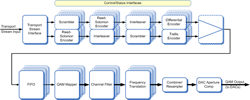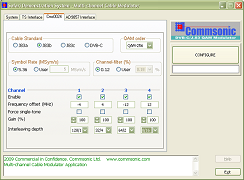|
|
| |
Global Partners
Exclusive Representative Contract
with Global Companies |
|
|
|
IP Core 제품 > Cable > Multi-channel DVB-C J83 modulator |
| |
|
Multi-channel DVB-C/J83 modulator |
| Product code: CMS0024 |
|
The CMS0024 multi-channel DVB-C/J83 modulator is fully compliant with the
European, US and Japanese downlink cable Standards DVB-C EN 300 429 and ITU J83
Annexes A/B/C (including DOCSIS 1.1/2.0). The core provides all the necessary
functions between transport stream input and a modulated QAM output.
The core
can be configured to support from one to four FDM channels with additional
(independent) channels accommodated by the instantiation of multiple single or
multi-channel cores per FPGA.
Multi-channel J.83B designs can operate either
from internal memory (short interleaving modes) or from shared external memory
(long interleaving modes) by means of a versatile access controller.
Typical
applications of the CMS0024 include head-end video and broadband data
transmissions systems (CMTS), cable modem test equipment and point-to-point
(PTP) or point-to-multipoint microwave radio links.
A range of synthesis
options allows the core to be tailored for any particular application.
Also
see: |
|
DVB-C/J83 modulator
DVB-C/J83 demodulator
Universal
QAM/PSK modulator
|
|
Block diagram

Click on image for further information
|
|
Safari Plug-in

Click on image for further
information
|
|
Downloads
E-mail
me when these downloads are updated |
|
Certification



| |
|
Standards compliance
DVB-C EN 300 429
ITU J83 Annexes A/B/C
DOCSIS 1.1/2.0 |
|
Features
Modulation accuracy > 45dB (MER).
Variable symbol rate interpolation.
Software selectable channel filter.
On-chip or off-chip interleaver memory.
1 to 4 channels per core.
Single or multiple standards per core.
Multiple cores provide > 4 channels. |
|
Applications
Head-end digital video and broadband data (CMTS) transmission systems.
Next generation, bandwidth-on-demand CMTS systems employing channel-
bonding. |
|
Implementation
Optimised for Altera.
Evaluation boards available. |
|
Plug-ins / Extensions
ASI/SPI
interface with TS PCR rate
adaptation. | | |
| | |
